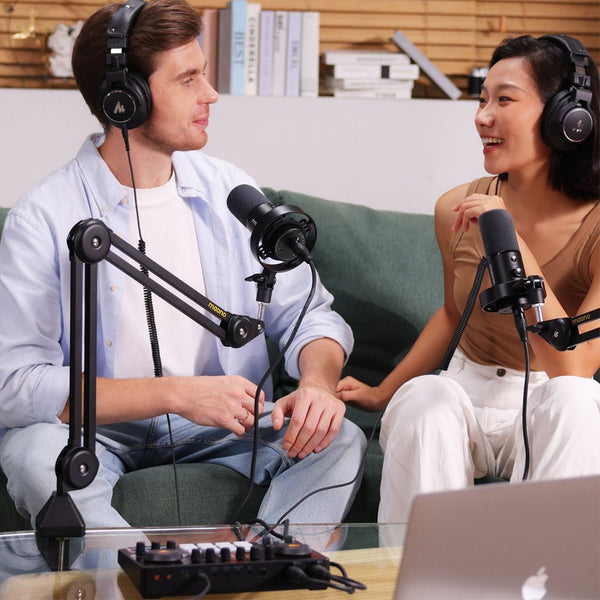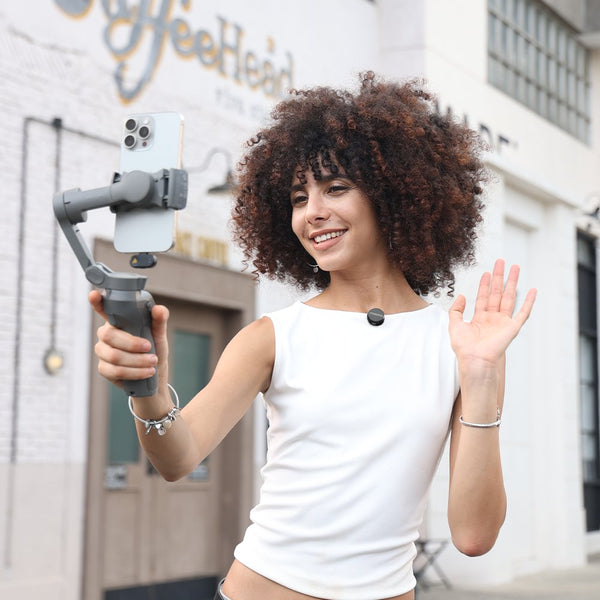In today's digital age, podcasts have become a popular medium for sharing knowledge, stories, and entertainment. Whether you're an aspiring podcaster or a seasoned professional, having the right equipment and using the best app for recording podcasts is crucial for capturing high-quality audio. One essential tool is a reliable podcast microphone.
In this article, we will explore the best free podcast application for recording on the go and the mobile-friendly podcast microphones offered.

1. Top Free Podcast Applications for Recording Podcasts on Android
When it comes to recording podcasts on your Android device, there are several excellent apps available that offer a range of features to enhance your recording experience. Here are some of the best podcast apps free for Android podcasters:
- Anchor
Anchor is a popular and user-friendly podcast creator app that offers a free podcast recording software solution for Android. It provides an all-in-one experience for recording, editing, and distributing your shows. With Anchor, you can record high-quality audio, add music and effects, and even conduct remote interviews.
It also includes trimming tools and intro/outro segments, making it one of the most beginner-friendly options. Once finished, Anchor doubles as a free podcast hosting platform, allowing direct distribution to Spotify, Apple Podcasts, and Google Podcasts.
- Spreaker Studio
Spreaker Studio is another powerful podcast editing app that also works as a recorder. It includes live broadcasting, multi-track recording, and detailed editing tools. Podcasters can apply effects, filters, and adjust levels to ensure professional-quality audio.
The free Android podcatcher app is also available for iOS users, and pro-users can also upgrade as they wish. Also, Spreaker allows you to schedule and automate podcast episodes, making it convenient for regular podcasting. Additionally, Spreaker Studio offers options for monetizing your podcast through ads and sponsorships.
- Audio Recorder
As its name suggests, Audio Recorder focuses on simplicity. While it lacks advanced functions, it’s a straightforward free podcast recording software option that allows quick, high-quality recordings in different formats. Perfect for those who want a lightweight app for basic solo podcasting.
It offers options for adjusting audio quality, choosing recording formats, and managing audio files. You can easily start and stop recordings, and the app provides a clean interface for managing and organizing your podcast episodes. Audio Recorder is an excellent choice if you prefer a lightweight app for basic podcast recording.
- Lexis Audio Editor
While Lexis Audio Editor is primarily a podcast editing app but also supports recording. You can trim, merge, reduce noise, and polish your audio before publishing. For creators who want extra control over audio, this app is an excellent companion to other recording tools.
With Lexis Audio Editor, you can fine-tune your podcast recordings, remove background noise, and add professional touches to your episodes. It supports various audio formats and offers an intuitive interface for easy editing.
- Smart Voice Recorder
Smart Voice Recorder delivers clean, high-quality recordings with background noise reduction. It includes a file manager for organizing episodes and makes it easy to share your podcasts. For creators who want a no-frills podcast creator app, this is a solid choice.
The app also includes a built-in file manager for organizing your recordings, as well as the ability to share your podcast episodes via email or other apps. Smart Voice Recorder is a reliable and straightforward option for recording podcasts on the go.
2. More Best Apps for Recording Podcasts on Android
Besides recording, having a strong podcatcher matters. The best podcast apps free include:
- Pocket Casts
- Podcast Addict
- Stitcher
These three apps cater to different needs, whether you're looking for advanced customization, comprehensive libraries, or curated content, making them excellent choices for podcast enthusiasts.
As an update, here’s three more examples of free podcast applications with feature comparisons:
AntennaPod
AntennaPod is a completely free, open-source podcast application built with privacy in mind, making it perfect for users who don’t want to trade personal data for functionality. Its clean, straightforward interface makes it easy to subscribe to and manage podcasts. Offline playback is seamless, allowing you to download episodes for listening without an internet connection. Since it’s open-source, it doesn’t rely on advertising or hidden tracking, giving you full transparency and control.
Podcast Addict
Podcast Addict is one of the most feature-rich free podcast apps available on Android. It supports a massive range of podcast directories, making it easy to find any show you want. The interface offers extensive customization options, though it can feel overwhelming for first-time users. Offline playback is well-supported with flexible download settings. While not open-source, Podcast Addict remains free to use and integrates with advanced tools like RSS feeds, audiobooks, and YouTube channels, making it a versatile choice for power users.
Castbox
Castbox stands out for its expansive podcast library available even in its free plan. Its polished interface is user-friendly and beginner-friendly, making browsing and discovering new shows simple. Offline playback is easy to set up, though some advanced features require a premium upgrade. While not open-source, Castbox integrates seamlessly with podcast directories and includes bonus features like in-audio search and personalized recommendations, appealing to listeners who want discovery as much as playback.
|
Feature |
AntennaPod |
Podcast Addict |
Castbox |
|
No-cost barriers |
100% free, no ads or paywalls |
Free with ads, optional premium |
Free plan available, premium for extras |
|
UI usability |
Clean, minimalist, simple |
Highly customizable but complex |
Polished, beginner-friendly |
|
Offline playback |
Strong support, easy downloads |
Flexible, advanced options |
Available but some limits in free tier |
|
Privacy & open-source |
Open-source, no tracking |
Not open-source, some ads |
Not open-source, ad-supported |
|
Integration with podcast directories |
Manual + standard directory support |
Massive directory + RSS, YouTube, audiobooks |
Huge library + discovery features |
Choosing the Best Free Podcast Application & Tips for Maximizing Use
When choosing the best free podcast application, consider your specific needs. If privacy and open-source values matter, AntennaPod is a great choice. For users who want advanced features and customization, Podcast Addict stands out. If you prefer an expansive podcast library and ease of discovery, Castbox offers a solid free plan. Look at factors like interface design, offline playback, and integration with directories or RSS feeds to match your listening style.
Tips for maximizing free podcast apps:
-
Enable offline mode to save episodes for commutes or when data isn’t available.
-
Customize categories to organize shows by genre or priority.
-
Connect with RSS feeds for independent podcasts not listed in mainstream directories.
-
Explore notification settings to stay updated on new episodes.
-
Regularly manage downloads to save storage space while keeping your playlist fresh.
Comparison of the Best App for Recording Podcast: A Quick Guide
1. Anchor
- Features:
- Easy recording and editing directly within the app
- Built-in hosting and distribution to major platforms
- Monetization options available
- Pros:
- Free to use with no hidden fees
- User-friendly interface for beginners
- Integrated music library
- Cons:
- Limited advanced editing features
- Ownership of content may be unclear for some users
- Use Case: Ideal for solo podcasters and beginners who want an all-in-one solution for recording, editing, and publishing
2. Spreaker Studio
- Features:
- Multi-track recording capabilities
- Live broadcasting options
- Audio effects and editing tools
- Pros:
- Great for live shows and real-time audience interaction
- Comprehensive editing features
- Cons:
- Some advanced features are limited in the free version
- Can be complex for new users
- Use Case: Best for podcasters looking to conduct live interviews or shows, as well as those who want to leverage multi-track capabilities
3. Audio Recorder
- Features:
- Simple and straightforward audio recording
- Ability to record in various formats
- Pros:
- Lightweight and easy to use
- No frills, focused solely on recording
- Cons:
- Lacks advanced editing features
- Limited sharing options
- Use Case: Suitable for quick, solo recordings or voice memos without the need for editing or complex features
4. Lexis Audio Editor
- Features:
- Multi-track editing
- Noise reduction and audio enhancement tools
- Pros:
- Powerful editing capabilities
- User-friendly interface
- Cons:
- Some features require a paid upgrade
- Limited sharing options for free users
- Use Case: Great for podcasters who need to perform detailed audio editing and enhancement on their recordings
5. Smart Voice Recorder
- Features:
- High-quality audio recording
- Options for background recording and file format selection
- Pros:
- Simple interface focused on recording Excellent audio quality
- Cons:
- Limited editing features Basic sharing options
- Use Case: Best for solo podcasters looking to capture high-quality audio quickly without the need for extensive editing
6. Pocket Casts
- Features:
- Podcast discovery and management Built-in audio effects and playback options
- Pros:
- Great for finding and managing podcasts User-friendly interface for playback
- Cons:
- Primarily a podcatcher, not focused on recording Limited recording features
- Use Case: Ideal for users who want a robust app for listening to podcasts, but it’s not suitable for recording
7. Podcast Addict
- Features:
- Podcast management, discovery, and playback Recording feature for voice notes
- Pros:
- Comprehensive podcast management tools Highly customizable interface
- Cons:
- Recording feature is basic and not its main focus Can be overwhelming for new users
- Use Case: Perfect for podcast enthusiasts who want to manage their subscriptions and occasionally record quick voice notes or ideas
8. Stitcher
- Features:
- Podcast streaming and discovery Custom playlists and offline listening
- Pros:
- Excellent for finding and listening to various podcasts User-friendly interface
- Cons:
- Primarily a listening app, not designed for recording Limited recording options
- Use Case: Best for users who want to discover and listen to podcasts rather than create their own
Summary
When choosing the best app for recording podcasts, consider your specific needs. For beginners, Anchor is a great all-in-one solution. If you’re looking to conduct live shows, Spreaker Studio is the way to go. For detailed audio editing, Lexis Audio Editor shines. Solo podcasters might prefer Smart Voice Recorder for its simplicity. While apps like Pocket Casts, Podcast Addict, and Stitcher are excellent for listening and managing podcasts, they may not be suitable for recording purposes.
Tips for Choosing the Best App for Recording Podcasts
When selecting the best app for recording podcasts, it’s essential to consider various factors that can significantly impact your podcasting experience. Here’s a concise guide to help you make the right choice.
1. Audio Quality
- Audio quality is paramount in podcasting. Look for apps that offer high-fidelity recording options. Ensure the app supports at least 16-bit/44.1kHz audio, which is CD quality. Some apps also allow you to record in higher resolutions, which can be beneficial if you plan to edit and master your audio later. Always check user reviews to gauge the audio quality others have experienced.
2. Editing Features
Many recording apps come with built-in editing tools that can save you time. Look for features such as:
- Trimming and Splicing: The ability to cut out mistakes or unnecessary sections easily.
- Noise Reduction: Tools that help eliminate background noise for a cleaner sound.
- Multi-Track Editing: Essential for interviews or panel discussions, allowing you to manage multiple audio sources seamlessly. Apps like Lexis Audio Editor and Spreaker Studio are known for their robust editing capabilities.
3. User Interface
A user-friendly interface is crucial, especially if you're new to podcasting. The app should be intuitive, allowing you to navigate easily and access essential features without a steep learning curve. Consider trying out different apps to see which interface you find most comfortable. A clean design with clearly labeled functions can make recording and editing much smoother.
4. Compatibility and Integration
Ensure the app is compatible with your devices, whether you’re using a smartphone, tablet, or computer. Additionally, look for apps that integrate well with other tools you might be using, such as cloud storage for easy access to your files or direct sharing options to podcast platforms.
5. Recording Options
Evaluate the recording options available within the app. Some apps allow you to record in different formats, while others offer features like remote recording for interviews. If you plan to have guests on your podcast, look for apps that support multi-person recording either locally or through the internet.
6. Storage and Exporting
Consider how the app handles file storage. Does it allow for local storage on your device, or does it offer cloud storage options? Additionally, check how easy it is to export your recordings. The best apps should let you share your podcasts directly to platforms like Spotify, Apple Podcasts, or social media.
7. Cost and Upgrades
Many recording apps offer free versions, but they may come with limitations or ads. Determine if you’re willing to invest in a paid version for more advanced features. Check the pricing structure and what additional features you gain with a premium subscription.
Choosing the right app for recording podcasts involves evaluating your specific needs regarding audio quality, editing features, user interface, and integration capabilities. Take the time to test out a few options, and don’t hesitate to switch if you find an app that better suits your podcasting style. With the right tools, you’ll be well on your way to creating high-quality, engaging podcasts!
3. How do I Record a Podcast on my Android Device?
Recording a podcast on your Android device is easy and convenient. Here’s a quick guide to get you started!
Step 1: Choose Your Podcasting App
First, download a reliable podcasting app. Some popular options include:
- Anchor: User-friendly with built-in editing tools
- Podbean: Offers various features for recording and editing
- Spreaker Studio: Great for live streaming and recording
Step 2: Set Up Your Recording Environment
- Find a Quiet Space: Choose a room with minimal background noise
- Use a Good Microphone: If possible, connect an external microphone for better sound quality. Many USB microphones are compatible with Android devices.
Step 3: Open the App and Start Recording
- Open your chosen app and create a new project.
- Check Settings: Ensure your audio settings are configured correctly (bitrate, format).
- Hit Record: Begin your podcast by tapping the record button. Speak clearly and at a steady pace.
Step 4: Edit Your Recording
After recording, use the app’s editing features to trim, cut, or enhance audio. Add music, sound effects, or transitions if your app supports them.
Step 5: Review and Finalize
Listen to your recording to catch any mistakes. Make necessary adjustments before finalizing your episode.
Step 6: Publish and Share
Once satisfied, follow the app’s instructions to publish your podcast. Share it on social media or with your audience via your website.
Bonus Tips:
- Plan Your Content: Have a script or outline to keep your podcast focused.
- Practice: Do a test recording to get comfortable with the app and your delivery.
- Engage Your Audience: Encourage listeners to give feedback or ask questions for future episodes.
4. The Importance of a Quality Podcast Microphone
To deliver a captivating podcast experience, clear and professional audio is essential. A quality podcast microphone ensures that your voice is crisp and your message is heard loud and clear.
MAONO understands the needs of podcasters who prefer recording on their Android devices. We offer a selection of mobile-friendly usb podcast microphones and wireless microphones that seamlessly integrate with your Android smartphones.
- PD400X USB/XLR Dynamic Microphone
PD400X is a multifunctional XLR/USB dual-mode dynamic microphone specially designed for online podcasting, it is really widely compatible with Windows, macOS, iOS, and Android operating systems, you can record on computers, mobile phones, and tablets.
A dynamic microphone is more durable and captures much less ambient noise compared to a condenser microphone. It's a preferred choice for recording vocals in untreated environments like homes and offices.
The Maono Wave T5 wireless microphone is an excellent tool for podcasters who want professional-grade audio with the convenience of wireless freedom. Compact yet powerful, it offers high-quality sound capture with low latency, ensuring your voice stays crisp and in sync whether you’re recording indoors or on the go. Its plug-and-play design makes setup effortless, working seamlessly with smartphones, cameras, and computers—perfect for solo podcasters, interview formats, or mobile creators. One of its standout features is its long battery life, giving you hours of uninterrupted recording, while the stable wireless connection ensures clear audio without dropouts. With its lightweight build, intuitive controls, and reliable range, the Wave T5 combines portability, performance, and ease of use—making it a unique choice for podcasters seeking flexibility without sacrificing sound quality.
Click to learn more: www.maono.com
5. Tips for Optimal Mobile Podcasting

- Find a quiet location
When recording on the go, it's important to choose a quiet environment to minimize background noise. Look for a secluded spot or use a portable sound booth to create a controlled recording space.
- Use headphones
Investing in a good pair of headphones will help you monitor the audio quality while recording. This allows you to catch any issues or inconsistencies in real time, ensuring a seamless recording.
- Experiment with microphone placement
Different microphones have varying optimal placement distances. Take some time to test the microphone's position in your mouth to find the sweet spot for capturing clear and balanced audio.
- Utilize windshields and pop filters
If you plan on recording outdoors or in windy conditions, consider using windshields or pop filters to minimize unwanted noise caused by air currents or plosive sounds.
- Practice proper microphone technique
Learn how to position and handle the microphone correctly to achieve optimal sound quality. Avoid tapping or hitting the microphone, as it can cause distortion or unwanted vibrations.
- Engage with your audience
Mobile podcasting allows you to connect with your audience in unique ways. Take advantage of the convenience by recording live episodes or conducting interviews on the spot. Engage with your listeners through social media platforms and encourage feedback and suggestions for future episodes.
- Continuous improvement
As you dive into the world of mobile podcasting, strive for continuous improvement. Regularly evaluate your recordings, gather feedback, and explore new techniques to enhance the quality of your podcasts. Experiment with different apps, microphone settings, and editing tools to refine your production process and deliver a top-notch listening experience.
- Unlocking the Potential of Mobile Podcasting

The combination of free Android recording apps and MAONO's mobile-friendly podcast microphones opens up new possibilities for podcasters. Gone are the days of being confined to a studio setup. With the flexibility and convenience of mobile podcasting, you can capture content on the go, conduct interviews in unique settings, and engage with your audience in real time.
FAQs:
1. What features should I look for in a free podcast recording app? When choosing the best app for recording a podcast, consider the following features:
- Audio Quality: Look for apps that offer high-quality audio recording and editing capabilities.
- Editing Tools: Some apps provide built-in editing tools, allowing you to trim, splice, and enhance your recordings.
- User Interface: A user-friendly interface makes it easier to navigate and use the app effectively.
- Sharing Options: Ensure the app allows easy exporting and sharing of your podcasts to various platforms.
- Multi-Track Recording: If you plan on conducting interviews or using multiple audio sources, multi-track support is essential.
2. Can I record podcasts on my phone with free apps?
Yes, many free podcast recording apps are specifically designed for mobile devices, allowing you to record high-quality audio directly from your smartphone or tablet. These apps often include features for easy editing and sharing, making it convenient for recording on the go.
3. Are free podcast recording apps reliable for professional use?
While many free podcast recording apps offer decent audio quality and features, their reliability can vary. For professional use, consider testing multiple apps to find one that meets your needs. Some free apps may have limitations in features or audio quality compared to paid versions. Always do a test recording and listen to the output before using it for important projects.
4. What’s the best free podcast application for Android?
Some of the top-rated free podcast applications for Android include Podcast Addict, Castbox, and AntennaPod. Each offers a wide range of features such as offline playback, easy subscription management, and customizable playlists. The best choice depends on whether you prioritize a large podcast library, advanced customization, or open-source reliability.
5. Are there any reliable, completely free podcast applications?
Yes, apps like AntennaPod are completely free, open-source, and ad-free, making them highly reliable for long-term use. Others, like Podcast Addict and Castbox, offer free versions with robust features, though some optional premium upgrades are available.
Conclusion
In conclusion, mobile podcasting offers a convenient and flexible way to create captivating content on the go. With the best free podcast application of your choice and Maono's mobile-friendly podcast microphones, you have all the tools you need to produce professional-quality podcasts. Embrace the freedom and versatility of mobile podcasting, and let your creativity shine.
Related Articles:
USB/XLR Microphones for Podcasting: Choosing the Best for Your Needs
Essential Guide to Podcasting: Top Microphones & Soundproofing Tips



